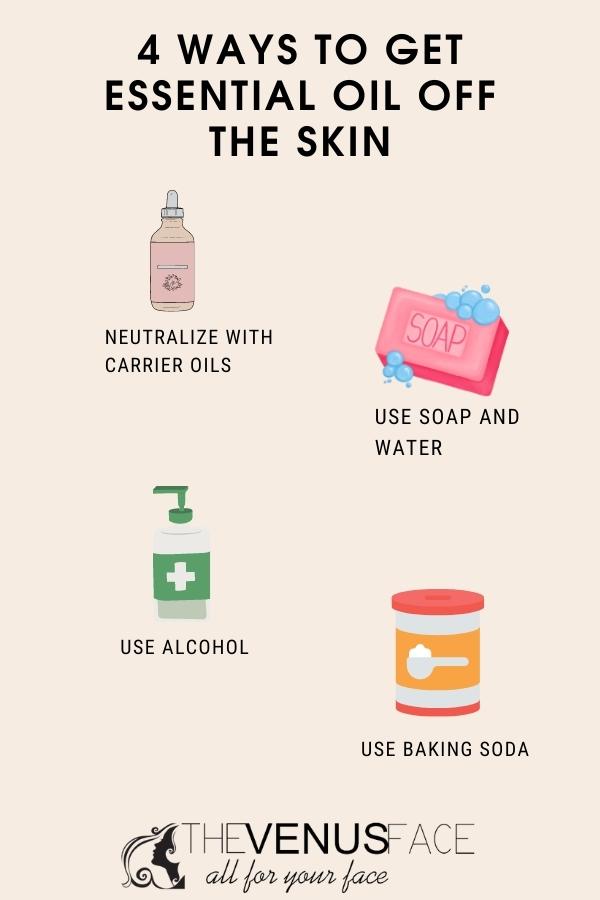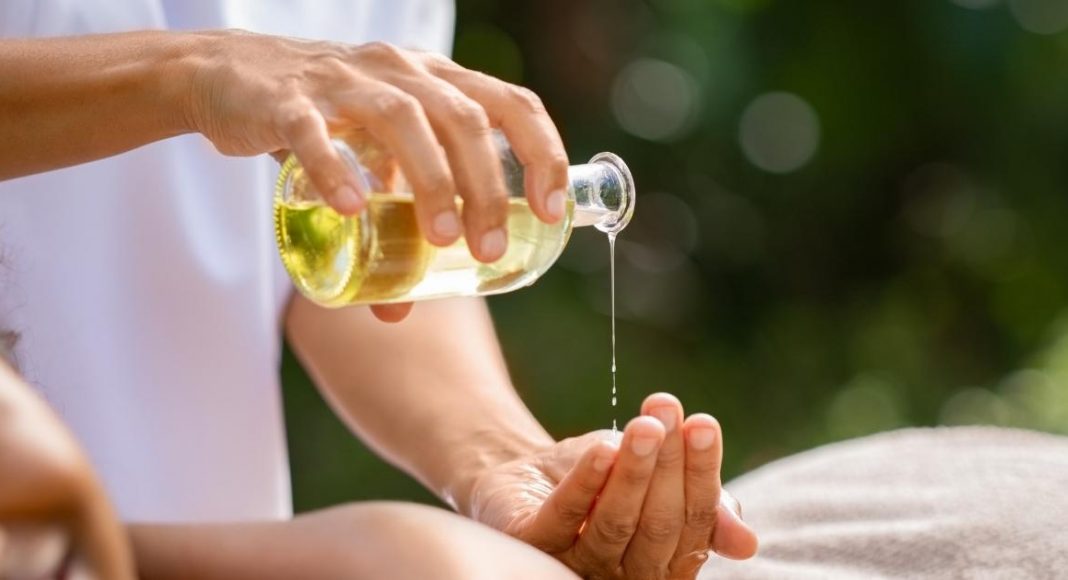Learn how to get essential oil off the skin in this post.
Essential oils are concentrated liquids that are extracted from plants. They are an important part of many skin care products because they can provide numerous benefits to the skin. For example, they can help to cleanse the skin, balance oil production, and reduce inflammation. In addition, essential oils can also help to fight bacteria and promote healing. When used in skincare products, essential oils can help to improve the overall appearance of the skin. As a result, they are an important ingredient in many dermatologist-recommended skincare products.
However, because essential oils are so concentrated, they can be difficult to remove from the skin. If you are not careful, you may end up with an oily residue on your skin that is difficult to remove.
If you are experiencing this problem, there are a few things that you can do to get rid of the essential oil residue on your skin.

4 Methods to Remove Essential Oils from Skin
There are a few different ways that you can remove essential oils from your skin.
Neutralize essential oils with carrier oils
As a rule of thumb, essential should never be used directly on the skin without being diluted with a carrier oil. Carrier oils are basically “fatty” oils that can help to dilute essential oils and make them less concentrated. Not only do they make essential oils easier to apply, but they can also help to reduce the risk of irritation. When used to remove essential oils from the skin, carrier oils can also help to “neutralize” the oil and make it less likely to cause problems.
Some good carrier oils that you can use to remove essential oils from your skin include:
To use carrier oils to remove essential oils from your skin, simply apply a small amount of the oil to a cotton ball or pad and gently wipe it over the affected area. You may need to repeat this process several times to completely remove the essential oil residue.
Use soap and water
If you don’t have any carrier oils on hand, or if you prefer not to use them, you can also remove essential oils from your skin with soap and water. This method is particularly effective if the essential oil has been diluted with a carrier oil before it was applied to the skin.
To remove essential oils from your skin with soap and water, simply wet a washcloth with warm water and add a small amount of gentle soap to it. Gently scrub the affected area for a minute or two and then rinse the area with cool water. You may need to repeat this process a few times to completely remove the essential oil residue.
Use alcohol
You can also try using alcohol to remove essential oils from your skin. Alcohol is a drying agent, so it can help to “suck” the oil out of your skin. Alcohol can be bought easily online or from the supermarket or pharmacy.
To use alcohol to remove essential oils from your skin, simply apply a small amount of rubbing alcohol to a cotton ball or pad and wipe it over the affected area. Continue to do this until all of the essential oil residues have been removed.
Use baking soda
Baking soda is another product that can be found easily in your kitchen. Simply mix together equal parts baking soda and water to form a paste. Rub the paste onto your skin where the essential oil is present. Let it sit for a few minutes, then rinse off with warm water. The baking soda will help to absorb the excess oil without stripping away your natural oils or leaving your skin feeling dry.
Final thought
No matter which method you choose, it is important to be patient and take your time. It may take a few tries to remove all of the essential oil residues from your skin. Be sure to rinse the area well after each attempt, and don’t forget to moisturize afterward. With a little bit of effort, you should be able to get rid of that essential oil residue in no time!
F.A.Q
How to get peppermint oil off the skin?
Peppermint oil is just like other essential oils, in that it needs to be diluted before being applied directly to the skin. The best way to remove peppermint oil from your skin is to use alcohol or neutralize it with carrier oils.
There are many ways to remove peppermint oil from skin:
- Wash with Soap and Water: Use soap and water to wash the affected area of the skin, gently rubbing in circular motions. Rinse thoroughly and pat dry with a clean towel.
- Milk and Baking Soda: Mix equal parts of milk and baking soda to create a paste. Apply the paste to the area where the peppermint oil is, and gently massage in circular motions. Rinse off with water.
- Use Carrier Oils: Apply carrier oil, such as coconut oil or olive oil, to the affected area. These oils can help neutralize peppermint oil and make it easier to wash off.
- Alcohol: Apply a small amount of rubbing alcohol to a cotton ball and gently dab the affected area. Alcohol can help dissolve and remove the peppermint oil.
- Water and Baking Soda: Create a mixture of equal parts water and baking soda. Apply it to the skin and leave it on for 10-15 minutes before rinsing off.
How to get eucalyptus oil off the skin?
Use a carrier oil to dilute the eucalyptus oil, then apply it to a cotton ball or pad and wipe it over the affected area. After that wash again with soap. Finally, rinse the area with cool water.
Can I use essential oils on my skin without diluting them?
No, essential oils should never be applied directly to the skin without being diluted in a carrier oil or another appropriate medium. This can cause skin irritation or an allergic reaction.
Are there any specific types of essential oils that are more difficult to remove from the skin?
Some essential oils, such as patchouli and vetiver, can be more difficult to remove from the skin due to their thick consistency. It is important to use a method that allows the oil to be absorbed or diluted in order to effectively remove it.
Can essential oils stain clothing or other fabrics?
Yes, some essential oils can stain clothing or other fabrics. It is important to use caution when handling essential oils and to avoid getting them on any fabrics or materials that may be stained.
Are there any potential risks or side effects associated with using essential oils?
Yes, there are potential risks and side effects associated with using essential oils, such as skin irritation, allergic reactions, and respiratory problems. It is important to use essential oils with caution and to follow the recommended usage guidelines for each oil.


